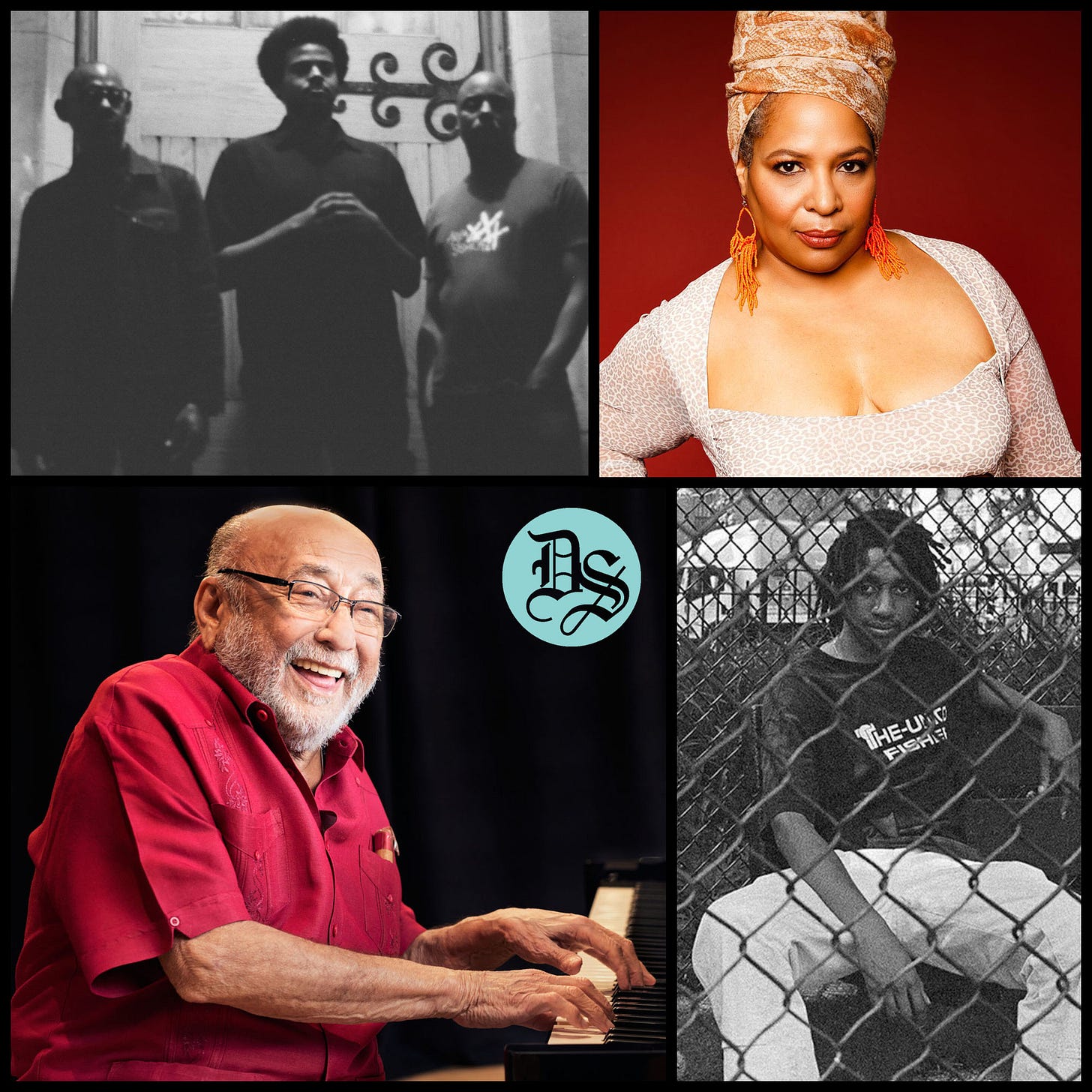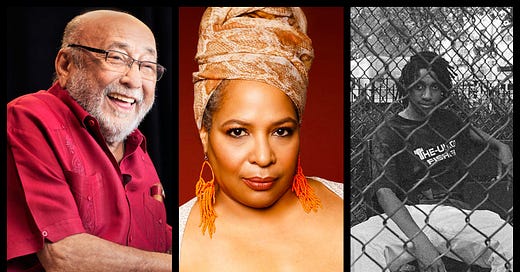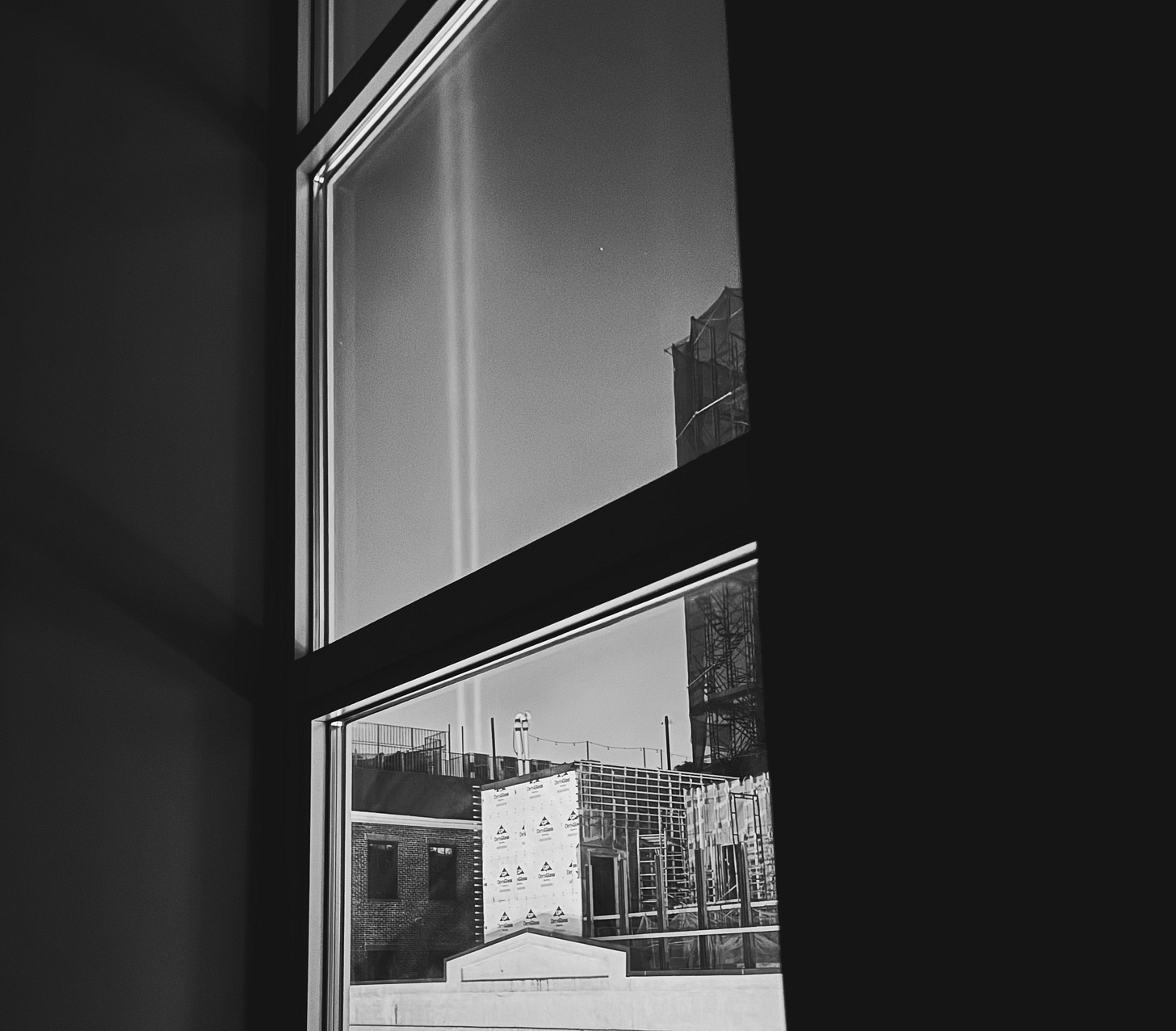Ghost Notes (on 9/11) | Bklyn Sounds 9/11/2024—9/17/2024
On music and the "other side of the veil" + This week's shows include: Luke Stewart Silt Trio / Fay Victor's Jean x 'Heavy Florals' / Sweater on Polo x 'Nonstop' / Eddie Palmieri Salsa Orchestra / ++

I opened my feed this morning, and there, between the post-debate memes, alongside the latest reports of a genocidal attack on Palestinian refugee camps in Gaza, and after the personal send-offs to Frankie Beverly (RIP), were photos of a clear blue sky. From Boston to DC, and, of course, over New York. There was also the annually expressed wonder of how often, over the past 23 years, the Northeast corridor experiences a gorgeous almost-cloudless anniversary of that one cloudless day that changed the world. Again, the weather played its part. And every year, when I look at that blue sky—today’s blue sky—I think of ghosts. Of the people and the ideas that are not there, at least not visibly. I think of the city that disappeared, or was prevented from ever coming to life. Of the sounds that stopped, and of the sounds that remain and continue to pierce the veil. And I think of the people who made those sounds but had to fly on, even if their departure did not necessarily take place on or around that day.
I guess what I am trying to say is that, if I have a personal general day of mourning, September 11th is it. Yeah, I grew up here. Yeah, I was around that day. Yeah I saw a plane hit the tower. Yeah I saw the World Trade Center collapse. Yeah it changed my life. And yeah music was a part of my story then. (I worked for CMJ at the time, the festival was supposed to start on September 12th, and…well, let’s just say I had a great show planned by musicians we now venerate but whom folks barely knew then.) Yet the stories and specters I contemplate on this day aren’t really my own, they are those of my adopted country, and the people and city I love. I think about how America has never been good at dealing with ghosts, at making peace with them, burying its own dead—or at making the dead “grateful,” as the folklore tales that gave my favorite band its name put it.
A few days after 9/11, my great aunt Maria Schneerson, one of my life’s sages in both the USSR and later the USA, said to me: “My life is split into two parts, a time before the war [World War II, she was in her late-20s when the Germans invaded in June 1941], and after. Now you have your own before and after.” She was right. Not only because the shock doctrines which soon followed 9/11 changed the globe and the city, and the very way many humans (especially Americans and the “Western world”) interacted. It also changed my own relationship with loss, and especially the part that music plays in that relationship. One thing I came to realize was how close listens to musical strategies (rhythms and improvisations, to name two), how the recognition of those strategies as community tools, and maybe even the psycho-analytical meanings of those strategies within communities, can all help cope with loss. It certainly led to the understanding that music was created to cope with the unfathomable, an idea that can affect the entirety of how we regard the world.
Of course, I’m not talking about writing shitty anthems or ballads, but this recognition could certainly be lyrical. One good example of that for me was a particular verse in “All My Friends” by LCD Soundsystem, a band that six years after 9/11 had become a kind of NYC touchstone for (let’s call us) survivors of the cultural and socio-political chaos at the century’s turn, who knew too much but did not want to simply go internet-numb. About three minutes into a Steve Reich--meets-house music piano epic that is cross-generational five borough map all its own, James Murphy sings an incredible line from an all-night dance-floor: that “if the sun comes up and I still don't wanna stagger home/Then it's the memory of our betters that are keeping us on our feet.” From the first listen, those “betters” struck me as folks in the shadow of the towers. But also, all those dancers left to die in the 1980s and early ‘90s when AIDS ravaged the gay communities Reagan ignored, who created the culture that Murphy was now referencing. Intentionally, purposefully dancing towards The Overwhelm, Murphy insisted, was a way to pay tribute. There are unstable layers in his idea of acknowledgement, but there are useful notions of ceremony and honor as well. To this day, bass-bins are some of the first things I look for after funerals, letting the low-end wash over me, and the tears flow.
More often, the ensuing references have been instrumental, or even sonically systemic. Arthur Jafa, the great filmmaker and arts-minded philosopher, has over the past decade spoken about how Black Atlantic music’s dub structure—the parts where the ensemble instruments play together “occupying a space,” before all but a single instrument drops out —is a signifier of loss, of what’s missing. “That dub structure makes you hyper-aware of all the things that are no longer there,” he says, before the return of all the instruments to the arrangement works as a “wish fulfillment,” a way to unpack the existential anger towards the unexplainable disappearances of Black Americans at the hands of the state and society. Jafa goes on, putting forth that emptiness at the heart of great Berlin dub-techno of the ’90s was the missing parts of Jewish life in post-Holocaust Germany, revealing the strategy’s application beyond a single community. One of Black music’s many gifts to the world is to create space for loss.
Another is how its ghosts, buked and scorned, haunt the lies of the present. Earlier this summer, reading Hari Kunzu’s 2018 novel, White Tears, a horror story in which two privileged young musicians start recreating blues records that were never supposed to exist and become possessed by the original makers, brought to mind the notion of American history as a haunting. With the recorded evidence to prove the ghosts are real. Especially the 20th century’s ghosts, littered as that period was with physical documents. Official archives have chosen to only occasionally acknowledge them, states either downplay or outright deny them, but everyone with a care in facts knows about their existence. You can read that as merely a critique of anti-woke or -Black studies legislation, but it applies to current culture as well. Growing old in the reflection of the last decade’s funhouse mirror has been a trip of self-questioning and doublespeak. The only clear directive being: keep your downloads safe, cite your predecessors, and don’t forget to leave flowers and a full shot-glass on the tombstone once or twice a year.
Because the ghosts are still listening from the other side. A few weeks back I finished a piece of writing for a friend, a Bklyn musician whose debut album will be dropping later this fall. I first met him through jaimie branch, the friendly ghost forever circling Dada Strain — and, he happily informed me, the lives of others. Duringour interview, the musician friend regaled me with tales of jaimie’s presence when after recording this music, which is partially dedicated to her memory, how he felt her spirit around before, during, after. And especially when a record company offered to release the album. “Take the contract doggie,” he heard in his head. As a New Yorker, he knew well enough to listen.
This Week’s Shows:
Frente Cumbiero is a decade-plus-old psychedelic cumbia, go-go R&B, dub and jump–up group from Bogota, co-founded and still presided over by producer/multi-instrumentalist Mario Galeano Toro. The quartet has old-school Bklyn roots: its early singles were released by the reliably on-point NYC Trust. Also scheduled: DJ sets by Chiqui B + Chichadelico + Pandemic. (Wed 9/11, 7p @ Good Room, Greenpoint - $15). The group is also playing a freebie on the UWS the following night. (Thurs 9/12, 7:30p @ David Rubenstein Atrium, Lincoln Center - FREE)
The excellent local label and event producer of immoderate digital music, 29 Speedway has a new compilation, UltraBody, which it is celebrating with a record release show. I can’t pretend that the participating artists—Pent, James Hoff, Kamran Sadeghi, Muein, Ex Wiish & Dorothy Carlos, Eric Frye and Tati Au Miel—are household names; yet all have performed at 29S shows, and contribute to an aesthetic (part hyper-tech cut-up, part art-school ambiance, part punk-noise) that’s added to my understanding the directions in which “rhythm, improvisation, community” are going. The Sound Room is a perfect place to experience this version of “future.” (Wed 9/11, 7:30p @ Public Records, Gowanus - $20-$25)
The Lester St. Louis and Luke Stewart-curated new-music monthly Assembly reaches drinking age, with a packed line-up. Episode #21 will feature drummer William Hooker, a veteran cornerstone of downtown’s punk-jazz coterie; improvised duo sets by Luke Stewart and vocalist/electronics player Shara Lunon, as well as by cellist Brent Arnold and metal-noise producer Randall Dunn; plus DJ sets from Phantom Honeymoon. (Wed 9/11, 8:30p @ Sisters, Fulton St - $15-$20)
Keep reading with a 7-day free trial
Subscribe to Dada Strain to keep reading this post and get 7 days of free access to the full post archives.



